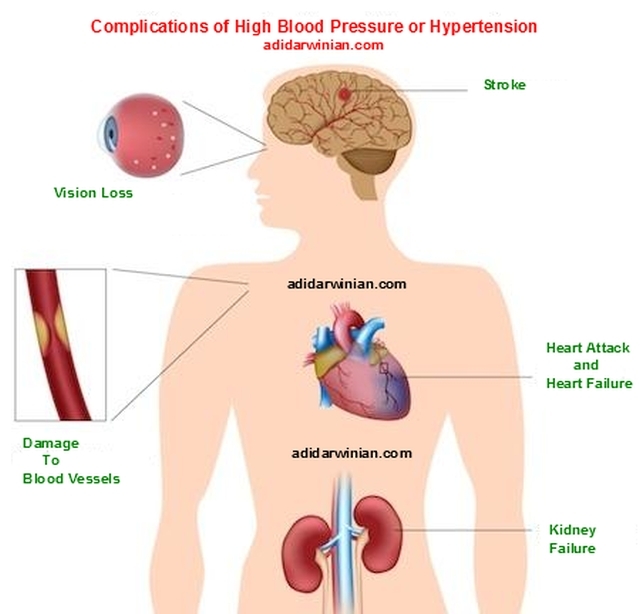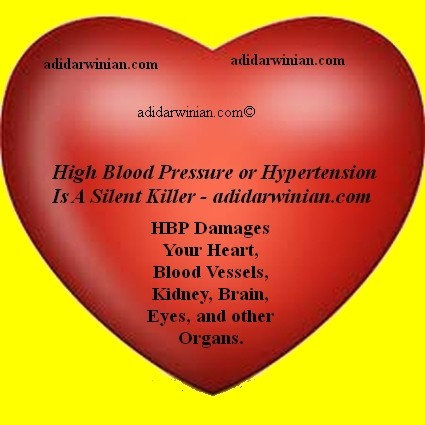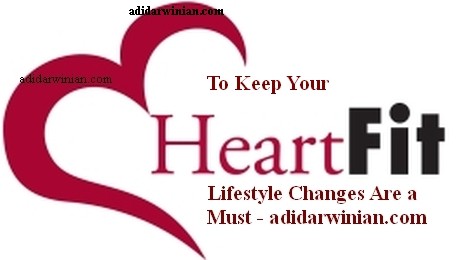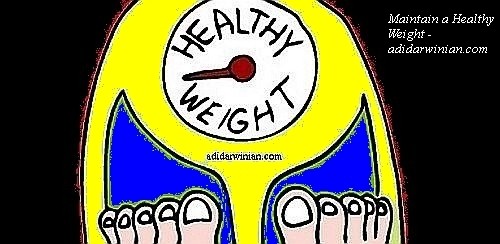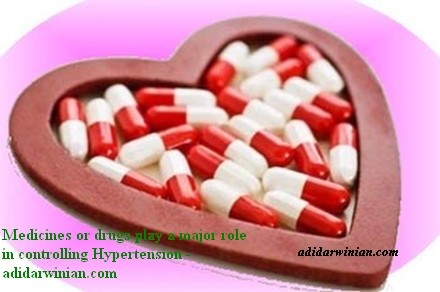This research article or paper focuses on the complications of Hypertension or High Blood Pressure. Complications of High Blood Pressure involve a multitude of deadly diseases. The author of this paper has tried to emphasize on the mechanism of development of complications, i.e., how the complications develop due to Hypertension. Pathophysiology of Hypertension resulting in the development of complications is investigated.
Complications of High Blood Pressure or Hypertension
“High Blood Pressure or Hypertension is a Key to a Multitude of Deadly Diseases”
“Rationally Coping with High Blood Pressure or Hypertension is the Choice of the Wise”
High Blood Pressure or Hypertension or HBP is a common medical condition. Usually, people suffering from this condition have no signs and symptoms until complications develop in the vital organs. So, if you have Hypertension, it will keep on damaging your organs without your knowledge. That’s why High Blood Pressure is aptly called as The Silent Killer. A person can have it for many years without knowing it. While a person may be unaware of his or her High Blood Pressure status, High Blood Pressure can damage his or her blood vessels, heart, kidneys, brain, eyes, and other organs of the body. Therefore, regularly getting your blood pressure checked is important, even if you are feeling healthy. If your blood pressure is already normal, then your health care professional or team can guide you how to maintain it. If a person’s blood pressure is high, treatment can help prevent damage to the organs.
High Blood Pressure or Hypertension or HBP when left untreated, over the time, can cause many complications as described below –
Damage to Heart and Arteries
High Blood Pressure or HBP or Hypertension places a higher workload on your heart and arteries, and can damage and block your arteries, can cause heart attack and heart failure. Arteries throughout the body get narrowed, which limits the blood flow, this can result in heart attack, kidney failure, stroke, amputation of part of leg, or loss of vision, and other problems.
- Hypertension damages and blocks your arteries. If you have Hypertension, the force on your arteries is very high. This high force creates microscopic tears in the walls of your arteries. These microscopic damages form the scar tissues, which in turn, lead to formation of the Plaques (Atherosclerosis). Substances found in the blood such as fat, cholesterol, fibrin (a clotting material), calcium, etc., collectively form plaque. Plaques narrow and harden the arteries. The narrowing or thickening of arteries limits the supply of the oxygen-rich blood to the body organs. Hypertension also speeds up the narrowing and hardening of arteries which is a part of the natural process of aging. When your arteries get narrowed, you have a greater chance for the formation of Blood Clots. Blood clots can get carried away with your blood until they get stuck in narrow spaces. These stuck blood clots can significantly or totally block the blood supply to various parts of your body.
- As High Blood Pressure causes narrowing of arteries, blood supply to the heart muscle gets reduced. This can cause Angina (Chest Pain or Discomfort).
- Hypertension or High Blood Pressure can cause Heart Attack. Heart attack occurs as a result of blocked blood supply to the muscle tissue of the heart. Hypertension makes the arteries that supply blood to the heart muscle (coronary arteries) thicker and harder as a result of formation of plaques (Coronary Heart Disease or CHD). These arteries supply oxygen-rich blood to your heart muscle. High Blood Pressure makes arteries prone to blood clots. When a plaque or a blood clot or both completely blocks a coronary artery, the blood flow to the heart muscle fed by that artery stops and heart muscle begins to die.
- The narrowed arteries interfere with blood’s ability to flow smoothly. This places a higher workload on your heart. Eventually, the heart thickens, becomes larger, and weaker. This can cause Heart Failure. Heart failure is a medical condition in which the heart is unable to pump enough blood to meet your body’s requirements.
Stroke
A Stroke occurs when an artery that supplies oxygen-rich blood to the brain gets blocked (Ischemic Stroke). Hypertension can cause such a blockage of arteries. Without oxygen and blood supply, brain cells starts dying within a few minutes. High Blood Pressure or Hypertension can also cause sudden bleeding in the brain (Hemorrhagic Stroke). The bleeding causes swelling and increased pressure in a person’s skull; this process damages brain cells.
Kidney Damage
High Blood Pressure causes arteries supplying blood to the kidneys to narrow and harden. When the arteries get narrowed, the nephrons (a nephron is a structural and functional unit of the kidney involved in the filtration of the wastes and excess fluids from the blood) do not get adequate amount of the blood and oxygen. This causes damage to them. When the blood vessels in the kidneys get damaged, they stop eliminating wastes and extra fluid from a person’s body. The extra fluid further raises the blood pressure, thus, a vicious circle starts. Hypertension is one of the main causes of Kidney Failure or End-Stage Renal Disease (ESRD).
Vision Loss
Hypertension can strain the blood vessels in the eyes, and the optic nerve. Hypertension can cause the blood vessels of eyes to either narrow or bleed due to too much blood pressure force. This may result in Vision Problems or Blindness. HBP or High Blood Pressure can also reduce the ability to see by causing swelling of the optic nerve. Optic nerve carries visual information from the retina of the eye to the brain. Disease or damage of the optic nerve can lead to Partial or Total Blindness. Hypertension can cause damage to the retina (Hypertensive Retinopathy). Hypertensive Retinopathy occurs as a result of damage to the blood vessels in the retina. Untreated High Blood Pressure can cause permanent vision problems or blindness.
Aneurysms
Hypertension can lead to the formation of Aneurysms. An aneurysm is an abnormal (balloon-like) bulge in the wall of an artery. Arteries have thick walls to withstand normal blood pressure. The force of High Blood Pressure or Hypertension by pushing against the weakened or injured walls of the arteries can cause an aneurysm. An aneurysm can burst or rupture, and thereby, can cause severe bleeding inside the body. An aneurysm may undergo a dissection, which is defined as a split in one or more artery wall’s layers. The split results in bleeding into and along the layers of the artery wall. Both the rupture of aneurysm and dissection of aneurysm are often fatal.
Common spot for aneurysms is the aorta which is the main artery that carries oxygen-rich blood from the heart to all the body parts except the lungs. Many people die annually from Aortic Aneurysm. Most of the deaths occur from Aortic Aneurysm Rupture or Aortic Dissection (also known as Aortic Aneurysm – Dissecting). Aneurysms also can occur in other arteries though less commonly. For example aneurysm can occur in the artery leading to the spleen; and the arteries in the brain, intestines, and legs.
Erectile Dysfunction
High Blood Pressure or Hypertension can cause Erectile Dysfunction or ED or Impotence. Erectile Dysfunction or ED is the inability of a man to get or keep an erection firm enough to have sexual intercourse. High Blood Pressure damages, hardens, and narrows the arteries carrying blood to the male sexual organ. This reduces blood flow and makes it difficult to achieve and sustain erection.
Dementia
Dementia is a brain disease that involves impaired intellectual functioning, loss of ability to solve problems, inability to maintain emotional control, memory loss, and impairment of language skills. Dementia may involve personality changes and behavioral problems like agitation, delusions, and hallucinations. High Blood Pressure or Hypertension or HBP can cause Dementia by narrowing and blocking the arteries that supply blood to the brain
Diabetes and Metabolic Syndrome
Metabolic Syndrome is the name given to a group of risk factors that raises a person’s risk for developing Heart Disease, Diabetes, and Stroke. High Blood Pressure or Hypertension or HBP, being a metabolic risk factor, increases the risk for developing Diabetes and other health problems.

